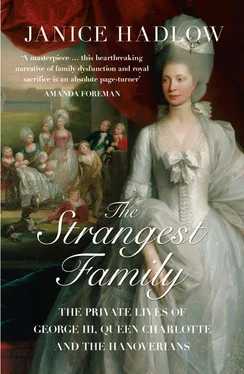Everything began to go wrong when families lost their natural moral compass: ‘Vice crept in. Love, ambition, cruelty with envy, malice and the like produced unnatural parents, disobedient children, diffidence and hatred between near relations.’ It all sounded remarkably like the home lives of George’s Hanoverian predecessors, as Bute perhaps intended that it should. The failure of self-regulating family virtue forced men to create artificial forms of authority – ‘hence villages, towns and laws’ – but as communities grew bigger, their rulers moved further and further away from the moral principles that were the proper foundation of power. The consequences were dire, both for the ruled and their rulers: ‘Unhappy people, but more unhappy kings.’ 96The amoral exercise of power ruined those who practised it. ‘They could never feel the joy arising from a good and compassionate action … they could never hear the warm, honest voice of friendship, the tender affections and calls of nature, nor the more endearing sounds of love, but here, the scene’s too black, let me draw the curtain.’ 97
For Bute, the lesson of history was clear: good government originated in the actions of good men. What was needed now, he concluded, was a return to such fundamental first principles. He summed up his programme succinctly: ‘Virtue, religion, joined to nobility of sentiment, will support a prince better and make a people happier than all the abilities of an Augustus with the heart of Tiberius; the inference I draw from this is, that a prince ought to endeavour in all his thoughts and actions to excel his people in virtue, generosity, and nobility of sentiment.’ This is the source of his authority and the justification for his rule. Only then will his subjects feel that ‘he merits by his own virtue and not by the fickle dice of fortune the vast superiority he enjoys above them’. 98
George embraced Bute’s thinking enthusiastically – and also perhaps with a sense of relief. He might have doubts about his intellectual capacity, and about his ability to dominate powerful and aggressive politicians, but he was more confident of legitimising his position by the morality of his actions. He suspected he was not particularly clever, but he was enough of his mother’s son to believe that he could be good – and perhaps more so than other men. He grasped at this possibility, and never let it go. It rallied his depressed spirits, jolted him out of a near-catatonic state of despair. It gave him a belief in himself and an explanation for his strange and unsettling destiny. It invested his future role with a meaning and significance it had so profoundly lacked before.
Bute’s vision of kingship transformed George’s perception of his future and shaped his behaviour as a public man for the rest of his life. Inevitably, it also dictated the terms on which his private life was conducted. He was unsparing in his interpretation of what the virtuous life meant for a king. He rarely flinched from the necessity to do the right rather than the pleasurable or easy thing, and he insisted on the absolute primacy of duty over personal desire and obligation over happiness. In time, these convictions came to form the essence of his personality, the DNA of who he was; and when he came to have a family, the lives of his wife and children were governed by the same rigorous requirements of virtue. As a father, a husband, a brother or a son, he was answerable to the same immutable moral code that governed his actions as a king. Bute taught him that in his case, the personal was always political; and it was a lesson he never forgot.
All this was to come later, however. When he took up his post, Bute was acutely aware of just how far short his charge fell from the princely ideal that was the central requirement of his monarchical vision. From the moment of his arrival, he set out to rebuild the prince’s tentative, disengaged personality, using a potent combination of threat and affection to do so. His first target was the prince’s lethargy, the subject of so much ineffectual criticism from Waldegrave and previous tutors. Bute was tenacious in his attempts to persuade George to show some energy and commitment to his studies; but it was a slow process, and one which required all the earl’s considerable powers of persuasion. By 1757, he had begun to make some progress, and the prince assured him: ‘I do here in the most solemn manner declare that I will entirely throw aside this my greatest enemy, and that you shall instantly find a change.’ 99It was not just George’s academic dilatoriness that Bute sought to tackle; he also attempted to root out other potentially damaging aspects of his personality that might compromise his authority when he came to be king. His pathological and disabling shyness must and would be conquered. Again, George declared himself ready to take up the challenge. He promised Bute that he was now determined to ‘act the man in everything, to repeat whatever I am to say with spirit and not blushing and afraid as I have hitherto’. 100
Although George confessed he was sometimes ‘extremely hurt, at the many truths’ Bute told him, he did not doubt that Bute’s ‘constant endeavours to point out these things in me that are likely to destroy any attempts at raising my character’ were for his own good, ‘a painful, though necessary office’. 101They were also, in George’s eyes, a sign of the depth of Bute’s regard for him, since only someone who really loved him would be prepared to criticise him so readily. ‘Flatterers, courtiers or ministers are easily got,’ his father had explained to him in his ‘Instructions’, ‘but a true friend is hard to be found. The only rule I can give you to try them by, is that they will tell you the truth.’ If George discovered such an honest man, he should do all he could to keep him, even if that required him to bear ‘some moments of disagreeable contradictions to your passions’. 102
George had no difficulty in submitting to Bute’s comprehensive programme of self-improvement, sadly convinced that all the criticisms were deserved. His opinion of himself could not have been lower. He was, he confessed, ‘not partial to myself’, regularly describing both his actions and himself as despicable. ‘I act wrong perhaps in most things,’ he observed, adding that he might be best advised to ‘retire, to some distant region where in solitude I might for the rest of my life think on the faults I have committed, that I might repent of them’. 103He was afraid that he was ‘of such an unhappy nature, that if I cannot in good measure alter that, let me be ever so learned in what is necessary for a king to know, I shall make but a very poor and despicable figure’. 104When he contemplated his many shortcomings and failures, he was amazed that Bute was prepared to remain with him at all.
The idea that Bute might leave – that his patience with his underachieving charge might exhaust itself – threw the prince into paroxysms of anxiety. Bute seems often to have deployed the idea of potential abandonment as a means of reminding George of the totality of his dependency. The merest suggestion of it was enough, George admitted, to ‘put me on the rack’, declaring that the prospect was ‘too much for mortal man to bear’. 105His self-esteem was so low that George was sure that if Bute were to depart, he would have only himself to blame. ‘If you should resolve to set me adrift, I could not upbraid you,’ he wrote resignedly, ‘as it is the natural consequence of my faults, and not want of friendship in you.’ 106George was endlessly solicitous about Bute’s health: the possibility of losing him through illness or even death was a horrifying prospect that loomed large in George’s nervous imagination; his letters are full of enquiries and imprecations about the earl’s wellbeing. When Bute and his entire family fell seriously ill with ‘a malignant sore throat’, the prince was beside himself with worry. He took refuge in his conviction that ‘you, from your upright conduct, have some right to hope for particular assistance from the great Author of us all’. 107It was inconceivable that God would not value Bute’s virtues as highly as George did; when the earl recovered, George presented his doctors with specially struck gold medals of himself to mark his appreciation of their care.
Читать дальше












